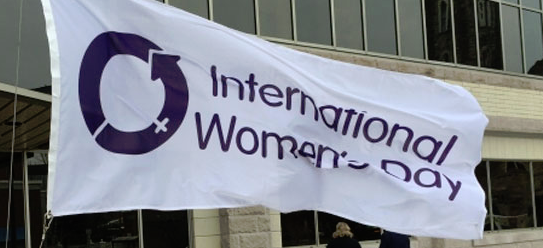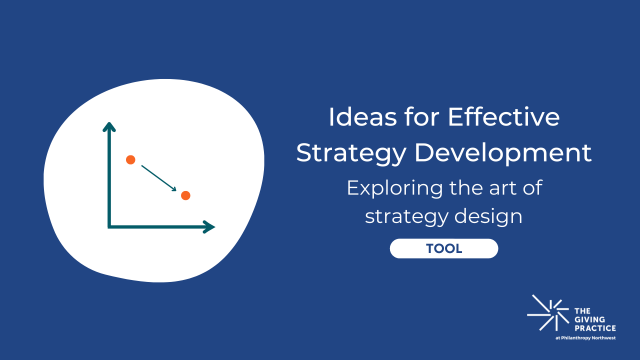March is Women’s History Month, including International Women's Day on March 8. While it is important to honor the extraordinary achievements of women and the progress we are making on issues of women’s rights and equality, many discouraging statistics persist. Only 4% of Fortune 500 CEOs are women; only five female CEOs are leading public companies in Washington state today. The Puget Sound Business Journal recently reported that only 18% of the new CEOs named in the Puget Sound region in 2016 were women. Among Washington’s full-time workers, women still earn an average of 78 cents for every dollar earned by men.
While some gains have been made, they have not been enough.
Fortunately, these statistics don’t represent my own experience working in the nonprofit sector for the past 20 years. I have always had female supervisors and my most important mentors have been women; in my current role as executive director of the Medina Foundation, I work with amazing women every day who are strong, innovative leaders.
I also know that my experience reflects that Northwest foundation statistics are an anomaly. Of the 25 largest foundations in the Puget Sound region, nearly half are run by women, including Susan Desmond-Hellmann of the Bill & Melinda Gates Foundation, Luz Vega-Marquis of the Marguerite Casey Foundation and Sarah Walczyk of the Satterberg Foundation. Across the Northwest, foundation and corporate giving programs have women at the helm including Rasmuson Foundation’s Diane Kaplan in Alaska, Northwest Health Foundation’s Nichole June Maher in Oregon, Montana Community Foundation’s Mary Rutherford and Idaho Community Foundation’s Karen Bilowith. Of Philanthropy Northwest’s 23 board members, representing leadership across six states, more than half are women.
Philanthropy Northwest Women's Leadership Cohort
To deepen our network's commitment to women’s leadership development, Philanthropy Northwest launched a Women’s Philanthropy Leadership Cohort in late 2015. I had the privilege of participating in the pilot cohort of seven leaders from Seattle and Tacoma. Our small group met five times over the course of the year, with the goal of building stronger connections, sharing our experiences, learning from and coaching each other. I personally hoped to gain a better understanding of my own leadership style and create a network of support that would last beyond our structured time together. I also wanted to try to identify the qualities that help women rise to leadership roles in philanthropy. The cohort members — all smart, dedicated, hard-working women — had four qualities that struck me:
- Storytellers. At one of our early meetings, we each had 10 uninterrupted minutes to share our stories. How did we come to be where we are? Instead of simply sharing highlights from resumes, each woman talked about how she grew up, her family and deepest influences. Although I had known several of the women for years, I learned more about them in those 10 minutes than in all of the time I’d known them. Memorable stories help us relate to each other and forge stronger connections. While we seek information from metrics and data in philanthropy, anecdotal stories are an important way to move people to action.
- Deep Listeners. For one of our most valuable exercises, we used a peer consultation tool from Cambridge Leadership Associates. In this process, we took turns being a case presenter, a note-taker and a facilitator. The case presenter presented the facts of a challenge that she was currently facing, followed by timed sessions for questions and responses from the group that resulted in a deep, introspective chance to look at a challenge from many different vantage points. The success of this was contingent on the group listening intently to the presenter. It’s not about jumping in to solve a problem — it’s about listening to truly gain understanding. As foundation leaders, we are supporting organizations that are on the front lines — doing the important work of providing services, community building and responding to emerging needs. It's imperative that we listen to those who see the needs, and those who experience the needs, firsthand.
- Vulnerability. This group wouldn’t have worked, and the two exercises above wouldn’t have succeeded, if participants hadn’t viewed vulnerability as a strength. To quote from University of Houston researcher Brene Brown, “Courage starts with showing up and letting ourselves be seen.” Engaging fully was essential to building trust within the group and empathy towards each other. In our sector, we often experience power dynamics between funders and nonprofits that can make it challenging to have direct, honest conversations. As a funder, being able to be open and admitting when you don’t know something or when you make a mistake can create more authentic relationships with grantees.
- An Abundance Lens. All of the women in this group talked about their commitment to helping other women and the need for more women in leadership positions in our field. There are certainly women who climb the ladder and take down the rungs as they go, but this group recognized that there is room for everyone. This is especially important as there is a critical need for more diversity in the sector’s leadership. More voices at the table, especially more women of color, can only make funders stronger. This is an issue that philanthropy needs to work together to address. It’s a promising sign that the sixth edition of Trends in Northwest Giving, a report that Philanthropy Northwest will release later this month, shows that funding for women and girls is a top priority for Northwest funders.
International Women's Day: March 8 and Beyond
 Listening to the stories of communities that are most affected by an issue, a strong desire to help others, and a belief that we can collectively make a difference are all needed to be an effective leader in philanthropy. These qualities that I observed in the cohort may explain why there is a higher representation of women in philanthropic work, especially in the Northwest, than in so many other sectors.
Listening to the stories of communities that are most affected by an issue, a strong desire to help others, and a belief that we can collectively make a difference are all needed to be an effective leader in philanthropy. These qualities that I observed in the cohort may explain why there is a higher representation of women in philanthropic work, especially in the Northwest, than in so many other sectors.
International Women’s Day is a global celebration of the social, economic, cultural and political achievements of women. It also marks a call to action to accelerate “forging a better working world — a more inclusive, gender equal world.” I’m personally going to strive to integrate all that I learned from my experience in the cohort into my daily work and to help other women come into leadership roles. It is up to all of us to build on the gains that have been made.
Jennifer Teunon is the executive director of the Medina Foundation.


